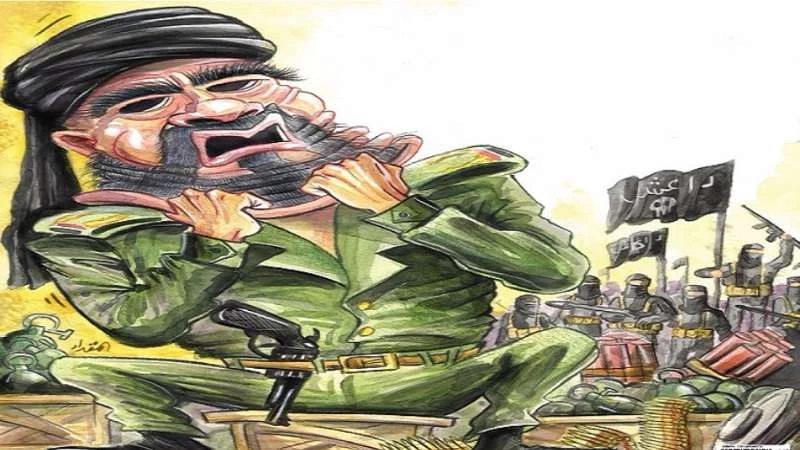The rapid growth of ISIS army and its overwhelming dissemination along with its appalling crimes that stunned the viewers worldwide with skillfully-directed hard-hitting video footage helped attract international alertness and urged many security and military analysts to examine the context and conditions under which it was created and helped invigorate its spawning.
However, amid the outpouring studies looking into this emerging military entity and questioning the significance and dimensions of its terrorist attacks, many ISIS experts have frequently wondered what made Iran and Iranian interests, so far, spared from ISIS schedule of targets, particularly Iran which, supposedly, stands as the organization’s bitterest enemy in the region?
Why didn’t ISIS target the very country shoring up Iraqi Shia militias and Assad regime whose clandestine relations with the terrorist group have been questioned many times by global media, especially after Assad regime withdrew from the ancient city of Palmyra leaving behind large stocks of ammunition and weapons?
A new news report published by Al-Majalla (The Magazine) may have the answers for those questions about ISIS relations with Iran. The report unravels the mysterious and suspicious links between ISIS founders and senior Iranian security officers through a detailed interview with a top dissident ISIS leader called Abu Ayyub.
The report shows how Abu Ayyub, a former Iraqi intelligence officer, joined insurgents in 2003, then became a military adviser for the nascent terrorist group.
In the interview, Abu Ayyub mentions how ISIS military founders Haji Bakr, Mazen Nohiri, and Abu Ali al-Anbari met first with Ibrahim Awad al-Bakri nicknamed Abu Bakr al-Baghdadi and convinced him to become the leader of the organization after the killing of Abu Omar al-Baghdadi in 2010.
Abu Ayyub explains why the founders chose Abu Bakr al-Baghdadi as a façade for the organization given that they were known for being Baathists and that the fundamentalist group needed a religious leader like Abu Bakr who was widely known as a scholar in the province of Anbar.
The interview which took place through a proxy, Abu Ayyub reveals how al-Baghdadi communicated with high Iranian intelligence officer called Ali Farmani who provided the former with top confidential information about other militant groups fighting in Syria.
Abu Ayyub also said that ISIS got a lot of funds and explosives from Iran which has long invested in the terrorist organization in an endeavor to practice pressures on the USA and other western countries in Iraq, Afghanistan and Pakistan. He added that Iran had a prominent role in helping ISIS take control over the city of al-Mosul early in 2014.
In return for Iran’s role in commandeering the city of al-Mosul and large swathes in Iraq and Syria, ISIS handed over the revenues of some oil wells to Iran, according to Abu Ayyub who said that Haji Bakr had shuttle visits to Syria where he had high coordination with Assad regime intelligence through an agent called Moaz al-Saffock and his cousin Ziyad who were close associates with Abu Bakr al-Baghdadi.
Abu Ayyub also reveals that many family members of senior al-Qaeda leaders still live in Iran, among them Osama Bin Laden’s family, adding that Bin Laden’s letters show many secret details about the relationship between al-Qaeda and Iran which depended on terrorist cells and mercenary militias as part of its nontraditional war strategy directed against Gulf countries, the west and the USA.
The dissident top leader also uncovers how Iranian General Hassan Salami has masterminded all ISIS military operations through his assistant Ali Farmani who had an important role in planning the mass escape from Abu Ghraib in Iraq when hundreds of convicts, including senior members of al-Qaeda, broke out of Iraq’s notorious jail as their comrades launched a military-style assault to free them.
Abu Ayyub continues that some of ISIS leaders didn’t believe that Iran could have any role in propping up their organization until they witnessed the meeting between a Syrian intelligence officer called Khidr and Ali Farmani on one side with Saffock and Haji Bakr on ISIS side in Syria back in 2013.
According to Abu Ayyub, Farmani explained how Iran helped ISIS in details and presented Abu Ghraib’s prison as an example. In return to Iran’s favor, ISIS gave in some Syrian oil wells to Iran and began exporting oil products in very cheap prices to Iran which in return re-exported it through its port in Bandar Abbas claiming that it was an Iraqi oil.
Abu Ayyub adds that ISIS leaders were aware that Iran was not helping them for free and that it had its own plans but their interest in finding support from a regional power made them accept that financial and military backing which included highly explosive materials that were purchased by Iran through Kurdish sides, according to Abu Ayyub.
The interview with Abu Ayyub is rife with other details about Iran’s role in systematically destroying Iraqi social texture and wealth and exploiting the situation in Syria to maintain its interests and expand its imperialistic ambitions.



التعليقات (1)